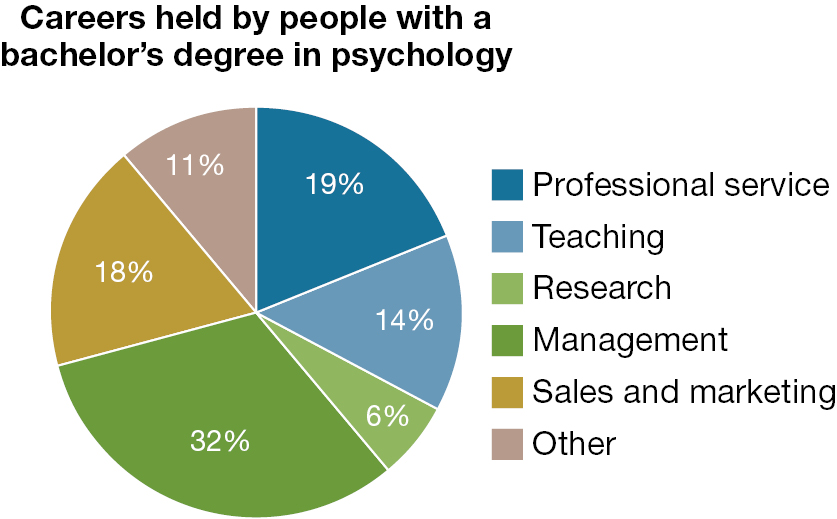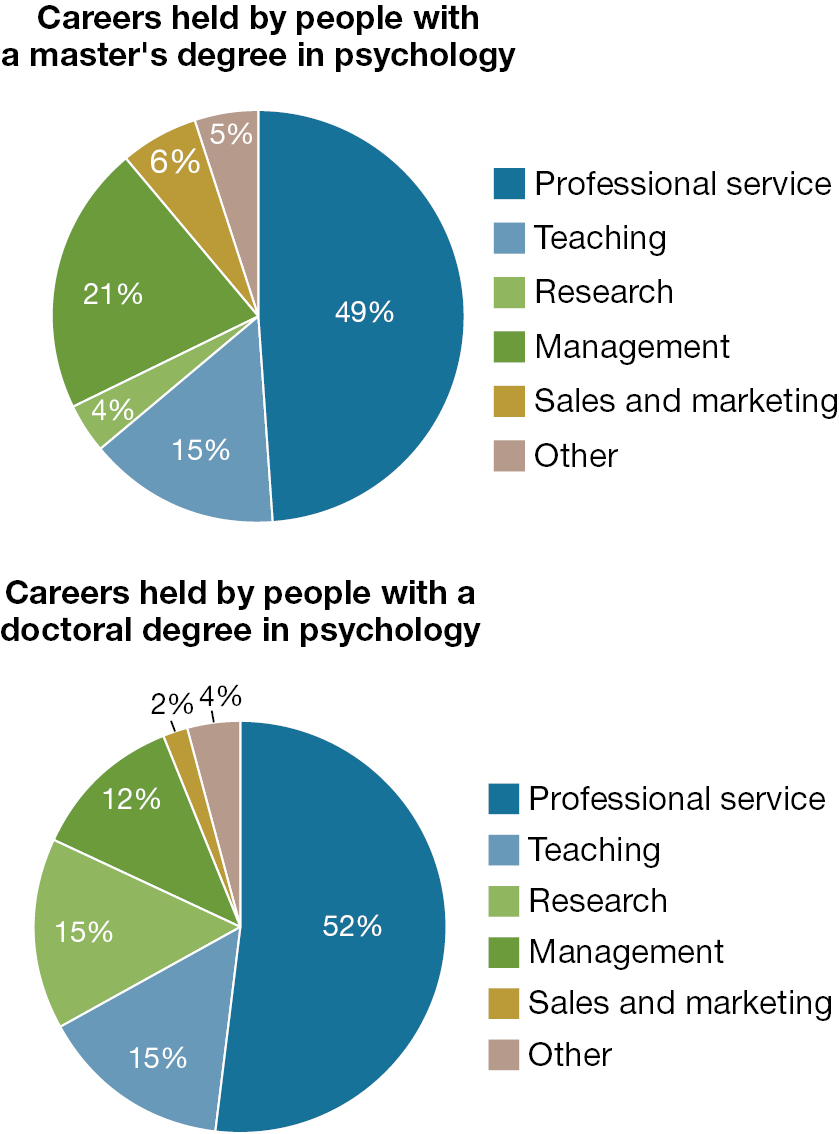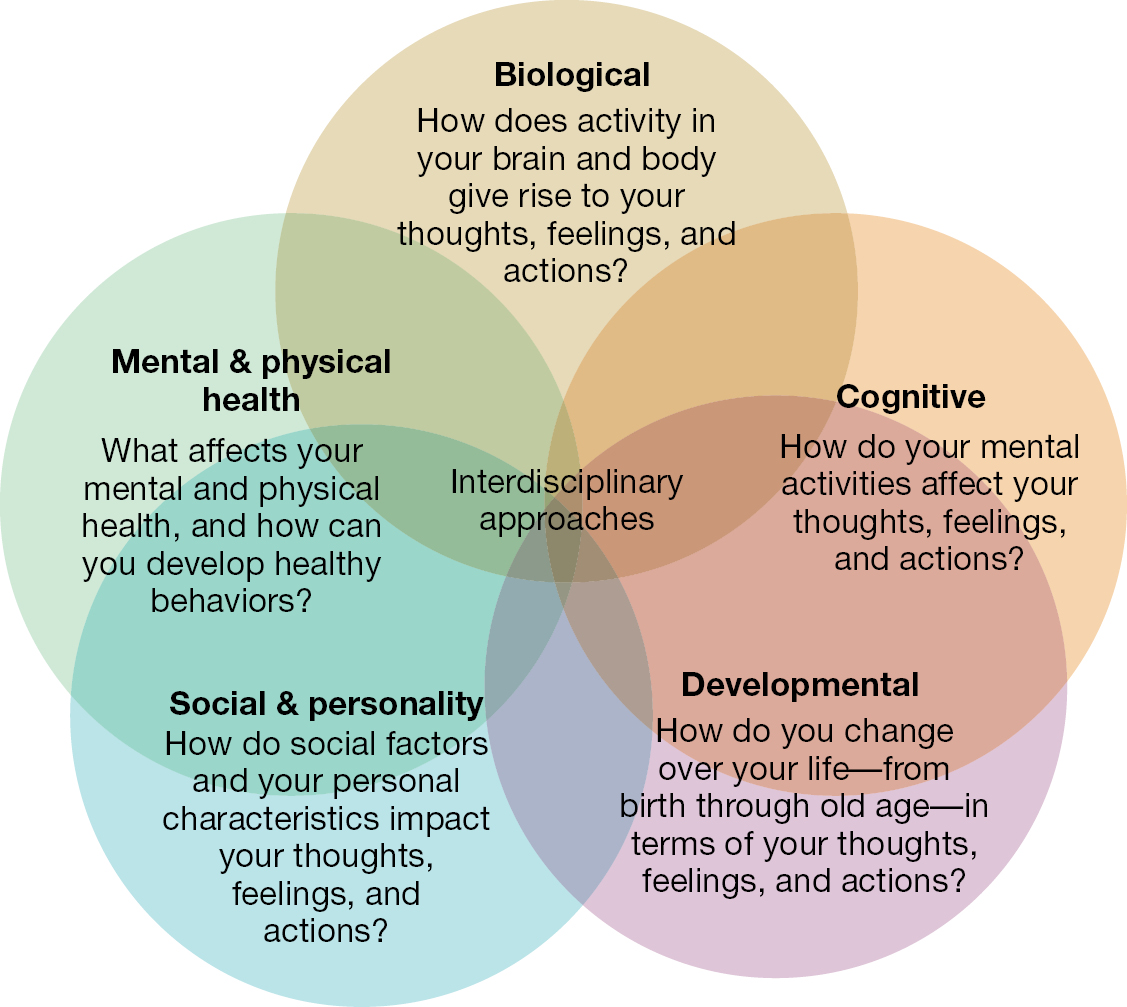LEARNING GOAL
Explain how the five domains of psychology work together to provide rich insight into psychological processes.
LEARNING GOAL
Explain how the five domains of psychology work together to provide rich insight into psychological processes.
Wilhelm Wundt’s first experimental psychology lab began a century of work by psychologists who had different perspectives on what was appropriate to study and the best empirical research methods to use. As a result, psychology grew as a field with many independent and competing approaches to studying mental activity, behavior, and the brain. Should psychologists study thoughts, as Wilhelm Wundt believed in 1879? Should they study only observable actions, as suggested by John Watson in 1913? Or should they work to understand mental activity and behavior by investigating the inner workings of the brain, as suggested during the “decade of the brain” beginning in 1990? Today, given the complexity of topics in the field, psychological processes are best understood when they are examined from several perspectives. Let’s explore these perspectives now.
If you are thinking about a career in psychology or a related field, there is plenty of good news. There is high demand for people who have a bachelor's, master's, or doctoral degree in psychology. Here are three reasons to be optimistic about a psychology degree.

Source: American Psychology Association (2018).
1 According to the National Center for Education Statistics (NCES), the associate’s degree in psychology is one of the fastest-growing associate’s degrees in the United States (National Center for Education Statistics, 2017). Over nearly two decades, there was an amazing 704 percent increase in the number of psychology associate’s degrees awarded, from 1,600 in 2000–01 to 12,500 in 2017–18 (Hussar et al., 2020). An associate’s degree in psychology can help prepare you for many different careers, such as personal care aide, human service assistant, and psychiatric technician (U.S. Bureau of Labor Statistics, 2021a).
Similarly, the bachelor’s degree in psychology remains one of the most popular in the United States. In fact, 6 percent of all bachelor’s degrees granted in 2017–18 were in psychology, for a total of 116,000 degrees (Hussar et al., 2020). According to the American Psychological Association (2018), people with psychology bachelor’s degrees today are employed in 92 different positions with almost 90 percent saying that psychology is relevant to their jobs. Most of these graduates with bachelor’s degrees have careers in one of six main fields, as shown in this pie chart.

2 Job opportunities are plentiful for students who choose to pursue a master’s or doctoral degree in psychology. Most people with these advanced degrees work as counselors, social workers, or psychologists, as shown in these two pie charts (American Psychological Association, 2018). According to the U.S. Bureau of Labor Statistics (2021a), opportunities for people with graduate degrees in psychology to provide counseling services, investigate psychological disorders, or conduct research on other psychological topics are expected to grow much faster than average, by about 8 percent through 2030. Clearly, people trained in psychology have many opportunities to use their knowledge and skills to help improve the lives of people everywhere.

Source: American Psychology Association (2018).
3 Even if you do not get a degree in psychology, you will be interested to know that the skills you develop while studying psychology are desired by many employers and useful in many jobs. As we have seen, critical thinking is a valuable skill in any job that requires evaluating information. Understanding issues related to diversity and ethics will help you successfully work with many different types of people. Understanding the scientific method is especially worthwhile in the health sciences, where professionals use strategies based on this empirical approach to treat and advise patients. Now is the time to start putting psychology to work for you—at work!
The Five Domains of Modern Psychology Psychologists today agree that there are several foundational and interconnected areas of study in the field. The domains of psychology reflect five areas in modern psychological research: (1) biological domain, (2) cognitive domain, (3) developmental domain, (4) social and personality domain, and (5) mental and physical health domain (Gurung et al., 2016). Each of these five domains focuses on exploring psychological processes from a specific perspective or question (Figure 1.8). In this textbook, each chapter tends to adopt the perspective of a certain domain. For example, Chapter 2, which is titled “The Role of Biology in Psychology,” explores psychological topics from the perspective of the biological domain. Chapter 8 is titled “Thinking and Intelligence” because it explores humans’ cognitive (thinking) abilities, including how we solve problems, reason, and make decisions.

The overlapping circles are labeled, clockwise, as follows: Biological - How does activity in your brain and body give rise to your thoughts, feelings, and actions? Cognitive - How do your mental activities affect your thoughts, feelings, and actions? Developmental - How do you change over your life - from birth through old age - in terms of your thoughts, feelings, and actions? Social and personality - How do social factors and your personal characteristics impact your thoughts, feelings, and actions? Mental and physical health - What affects your mental and physical health, and how can you develop healthy behaviors? The overlapping region is labeled, Interdisciplinary approaches.
FIGURE 1.8 Five Domains of Psychology Allow Exploration of Topics from Multiple Perspectives
Each of the five domains investigates psychological topics from a particular perspective. Because each domain is interconnected with every other domain, interdisciplinary work can occur in any combination of two or more domains, as shown in the center of the figure. Each chapter in this book focuses primarily on one or two main domains. In addition, every chapter describes research across several domains to provide a richer understanding of psychological processes.
In addition, Figure 1.8 shows how these domains are all interconnected. These interconnections suggest that studying psychological processes from the viewpoints of two or more domains can provide richer understanding. For example, in the field of cognitive neuroscience, researchers investigate a topic through the lens of both the biological and cognitive domains.
Due to the interconnections among all of the domains, you will find that every chapter in this textbook contains information based on the work of psychologists from multiple domains. For example, in each chapter you will find information about how activity in your body and brain (the biological domain) relates to all of your life experiences. Let’s now look at a specific example to understand how we gain a richer understanding of psychological phenomena by considering them from multiple domains.
The Domains of Psychology Provide a Rich Understanding of Psychological Processes Do you have trouble falling asleep at night? Maybe you can get to sleep but you keep waking up, or maybe your sleep schedule is off and you are up most of the night studying, working, texting, or playing video games. In the United States, 35 percent of adults get less than the seven hours of sleep recommended each night (Y. Liu et al., 2016). Furthermore, college students rarely get enough good-quality sleep, and poor sleep has a negative effect on academic performance (American Academy of Sleep Medicine, 2017). To understand what happens during sleep and the important role that sleep plays in our lives, psychologists explore this topic across the domains of psychology.
For example, a psychologist may investigate what happens to brain activity during various stages of sleep, which is part of the biological domain. Another psychologist might be interested in understanding how a lack of sleep affects memory and academic performance, which is related to the cognitive domain. Other researchers investigate sleep from the developmental, social and personality, or mental and physical health domains. Some psychologists take an interdisciplinary approach to the topic by working collaboratively with researchers who specialize in topics studied in other domains.
In short, psychologists work across the five domains because they are concerned with nearly every aspect of human life. In addition to investigating sleep across these domains, psychologists also conduct research across many domains to help us understand why we love (or hate) certain music, such as K-pop (Figure 1.9a), or how having a pet improves health and well-being (Figure 1.9b).
FIGURE 1.9 The Work of Psychologists Across the Domains Influences Us Every Day
Psychologists today investigate psychological topics across several domains. (a) Psychologists working across the social and personality, developmental, and cognitive domains have explored why people love K-pop, which is modern Korean pop music involving glossy production, electronic elements, and the visual dazzle of girl bands or boy bands. (b) Psychologists working across the mental and physical health, biological, and cognitive domains have found that owning a pet improves our well-being.
LEARNING GOAL CHECK: REVIEW & APPLY